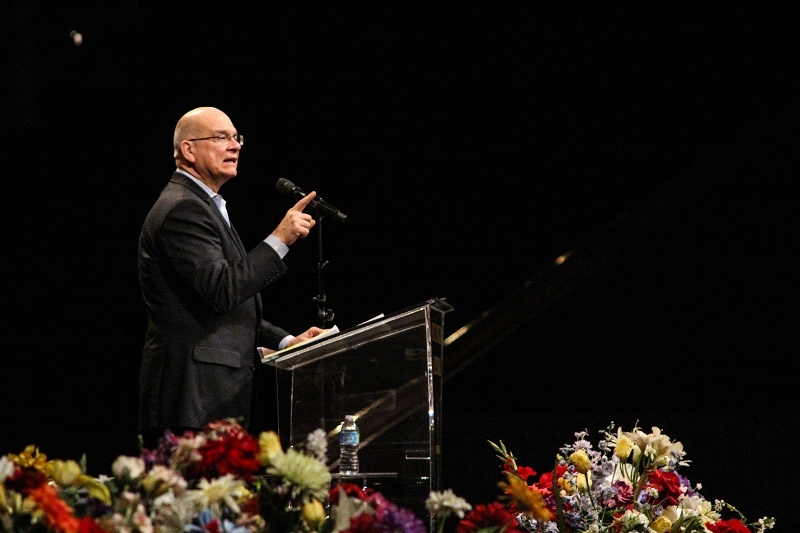

Pastor Tim Keller, the lead pastor of Redeemer Presbyterian Church, spoke on the ways that living out the gospel would affect the social challenges of a city.
Pastor Tim Keller, the lead pastor of Redeemer Presbyterian Church in New York, was featured as one of the main plenary speakers for the TogetherLA Conference, a conference at which individuals from various backgrounds gathered to learn and discuss how they can more actively love the city of Los Angeles.
On Friday morning, which was focused on the social challenges of Los Angeles, Keller shared that the gospel lived out would and should tangibly affect societal norms and attitudes, and thereby affect conditions of society as a whole. He shared that this has already happened in history.
"Consider the question, "Why wouldn't you knock an elderly woman over?'" Keller posed. In a much older, western society, many would answer that they would not knock a woman over because it would hurt their reputation"”that hurting someone who is weaker than themselves is beneath them.
However, Keller said, when Christianity came along, "it massively changed society" to the point that now, most people"”both Christians and non-Christians"”would say that they would not hurt someone because it "would hurt the other person."
"Society before Christianity valued pride and self, rather than humility and other," Keller said.
Keller further explained that the gospel could similarly change societal norms today.
"If Christians lived out the social implications of the gospel, we would see changes in five areas: justice and power; pluralism and peace; vocation and truth; the arts; and a counterculture of sex."
First, in terms of justice and power, Keller focused on the fact that if the social implications of the gospel were lived out, there would be "more equity of wealth" and "much more generosity." He pointed to Matthew 5:3, which says, "Blessed are the poor in spirit, for theirs is the kingdom of heaven."
"As a Christian, we should know that we have absolutely no assets. Having a spiritually bankrupt mindset means that I know that even the good things I do, I do for the wrong reasons. Therefore, I've got nothing," he continued. "It's telling Jesus, I need absolute, bleeding help from you."
"If you are a Christian poor in spirit you can never see yourselves as superior to the poor. All the superiority is gone. And if you are poor in spirit, you would pour yourself out for the poor."
Second, Keller said that Christianity "has the potential for the truly inclusive pluralism that people are yearning for" because of the fact that only in Christianity is identity "received rather than achieved." An achieved identity is exclusive, Keller said, but a received identity that is not based on self's own achievements is "uniquely humble and open to people who are deeply different," he said.
Third, the gospel should affect the way that Christians work, Keller said. Christians should see their job as a way to serve others regardless of sector. He further said the gospel should affect the way in which they do the work, including living lives of integrity within the workplace.
Fourth, the gospel lived out would affect the arts. Keller said that many who are in the arts cater to two different extremes: an extreme that sees everything in a nihilistic and pessimistic perspective, and another extreme perspective that is idealistic/optimistic in which everything is hopeful. In contrast, Keller proposed that Christians should give a realistic view of hope through the gospel, and portray this through art.
Fifth, Keller said that the gospel lived out would create a counterculture of sex. While modern society sees sex as a way of self-fulfillment, he said that the church must treat sex and love as a way to serve the spouse and the community.
"In here [the church], we'll do what the Bible says, and we'll see how things are in 50, 60 years," he said.
TogetherLA took place from February 26 to 28 at the West Angeles Church of God in Christ. Pastor Tim Keller spoke during the Thursday night session, Friday morning and afternoon sessions, and Saturday night city-wide gathering. The conference discussed loving the city in multiple ways: through the church; by addressing social challenges in the city; by affecting the culture of Los Angeles; and within the workplaces.
Patrick Lee contributed to this article.


















